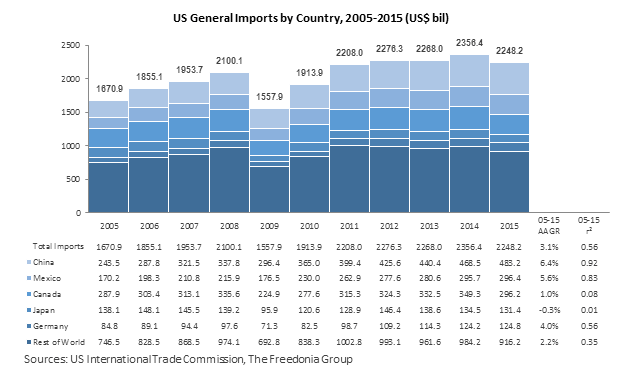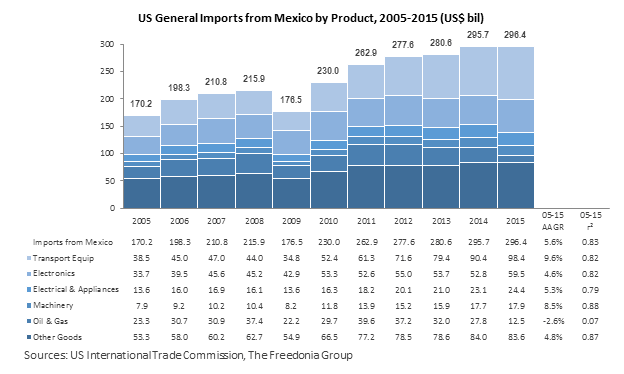Sweeping Impacts of the Proposed Mexico Import Tax
by Matthew Rolfe
January 30, 2017
On January 26, 2017, the Trump administration suggested a 20% tax on imports from Mexico, in order to fund construction of a wall separating the countries. As Mexico represents the US’ second-largest source of general imports (which includes the value of goods intended for re-export), this begs the question:
Which US industries and markets could be impacted by a tax on imports from Mexico?
Here’s a quick reference guide to the markets and industries that you might want to brush up on, and the relevant published research available from Freedonia Focus Reports.
Mexico is a Leading Source of Imports
For context, US general imports from Mexico totaled $296.4 billion in 2015, accounting for a 13% share; behind China at 21% and narrowly ahead of fellow NAFTA partner Canada. General imports from Mexico increased at an average annual rate of 5.6% over the 2005-2015 period.

High-Value Durable Goods Top Imports from Mexico
The Top 5 categories of goods imported from Mexico, in value terms, include:
- transportation equipment (eg, motor vehicles)
- computer and electronic products (eg, audio video equipment)
- electrical equipment, appliances, and components (eg, control technologies)
- machinery, except electrical (eg, HVAC equipment)
- oil and gas (eg, crude petroleum).
For information on these industries and markets in general, see related reports, such as the examples given in parentheses.

From an industry perspective, production of these goods is tied to relatively inflexible capacity, which is constrained by high capital costs. Relocation to the US to avoid a trade tax would be a non-trivial matter; firms would likely need to absorb the cost to the detriment of profit margins and/or raise prices. US firms may absorb some of the cost so as to not drive customers toward cheaper products produced by less disadvantaged domestic firms and/or foreign competitors.
But absolute value isn’t the entire story.
Mexico holds major shares of smaller import categories such as:
- 30% of agricultural product imports (in value terms) originated from Mexico in 2015
- 20% of imported beverages
- 16% of imported waste and scrap.
In many of these industries, the locus of production is often bound by immutable factors. Climate, prevailing weather conditions, and appellation constrain production of certain agricultural products and beverages (eg, the US cannot produce “Mexican” beer or the distilled spirit tequila). Similarly, waste and scrap generation, which can be thought of as high concentration raw material for recovery (eg, recovered metals), is often constrained by the capital good retirement for recycling and the productivity of the scrap-generating, inflexible industries mentioned previously.
Network Effects to Consider
US consumers would not be alone in experiencing fallout from an import tax. Constraints on trade with Mexico would impact US firms that feature Mexican establishments as part of their supply chains. Supply chain disruptions would likely impact warehouse and storage providers, particularly border-facing establishments. To further state the obvious, a tax would affect demand for the freight services associated with cross-border transport. Motor vehicles, the poster child for the proposed import tax, accounted for 73% of goods imported by rail (in value terms) from Mexico in 2014.
Want to Learn More?
In short, now might be a good time to consider a subscription to the Freedonia Knowledge Center. With unlimited access to a large collection of insight-packed market research reports and free updates, a subscription is looking like the most economical option for 2017.
Have unique research needs?
Freedonia Custom Research listens intently to your needs and objectives. Then we work diligently to define and deliver a service to meet them.Subscribe to Our Blog
Stay up to date with the latest information about new market research and news in areas relevant to your business from our analysts and team members.Freedonia Focus Blog Subscription
Provide the following details to subscribe.